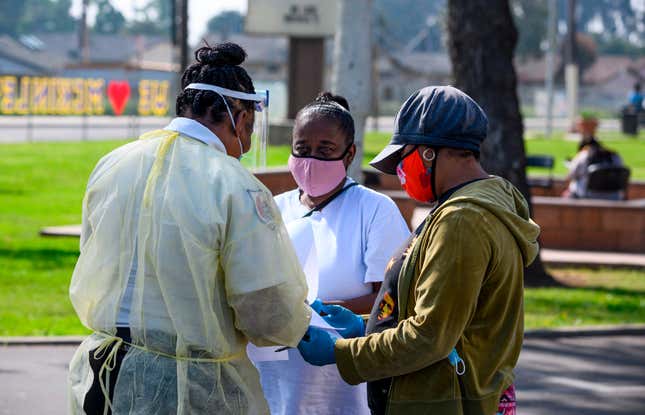
Nearly three months after the first confirmed COVID-19 case in the U.S., more than 1.1 million people have been infected with the coronavirus, with at least 92,000 deaths recorded. But despite the clear and pervasive toll the virus has had on Americans and American life, a substantial number of states and territories are still not reporting important information about who is contracting the virus.
As The Hill reports, 10 states have still haven’t released racial data on their coronavirus deaths, according to the COVID Tracking Project and the Antiracist Research & Policy Center. An additional five territories also have not reported these numbers.
A number of reports have shown that black people, indigenous Americans, and Latinx have been disproportionately devastated by the pandemic, but these are largely based on local data. Nationally, the impact of the coronavirus across racially and ethnic lines still has a lot of missing gaps. According to Johns Hopkins’ Coronavirus Resource Center, only Illinois, Kansas, and the District of Colombia have released comprehensive coronavirus data by race (this means not only testing deaths and confirmed cases, but who has been tested).
Federal and state lawmakers have gotten increasingly agitated at the lack of comprehensive data. On Tuesday, Congresswoman Ayanna Pressley (D-Mass.) joined Senator Elizabeth Warren (D-Mass.) in calling out the Department of Health and Human Services (HHS) for its “negligent” reporting on racial disparities in COVID-19 cases.
“This data is essential to getting resources, PPE and testing to communities hardest hit. This Admin is used to skirting the law, we’re used to calling them out,” the progressive congresswoman wrote on Twitter.
As another round of aid legislation makes its way through congress, public health experts and policymakers have become increasingly stymied by the lack of adequate reporting. According to The Hill, one of the coronavirus response bills stipulated $500 million go toward modernizing our public health infrastructure—a provision which would include better data collection—but did not mandate that racial and ethnic data be part of that.
Michigan was among the first states to announce a dedicated task force to study racial disparities in COVID-19 cases and the spread of the coronavirus. Part of that effort included building upon existing racial disparity data from studying maternal mortality in the state.
Lieutenant Governor Garlin Gilchrist told The Root in April the state wanted to provide a national model in how to tackle the disparities, especially without a unified national strategy or sound numbers.
“In the absence of that data and information, it is not possible to observe and then design interventions,” Gilchrist said.
“This issue of access to data is essential,” Michael McAfee, president and CEO of the racial equity advocacy group PolicyLink, told The Hill.
“This is a values statement around who matters and whether we will erase them by ignoring the data that would tell the story of their plight, but also ignore them in terms of recovery efforts,” he said. “The bottom line is: If we are going to recovery successfully, if we are going to make sure those most impacted have resources they need to recover and thrive, this data is essential.”

